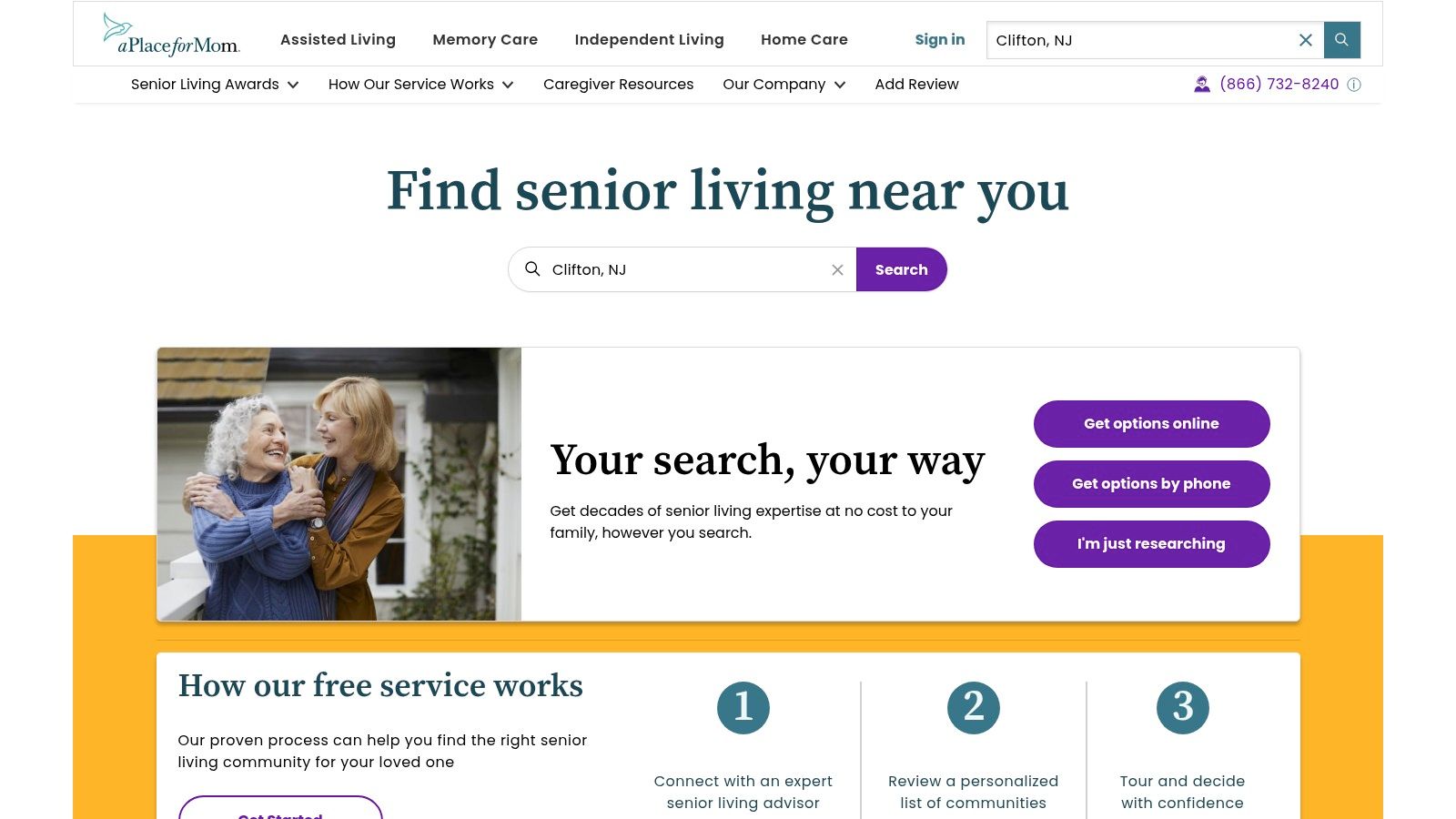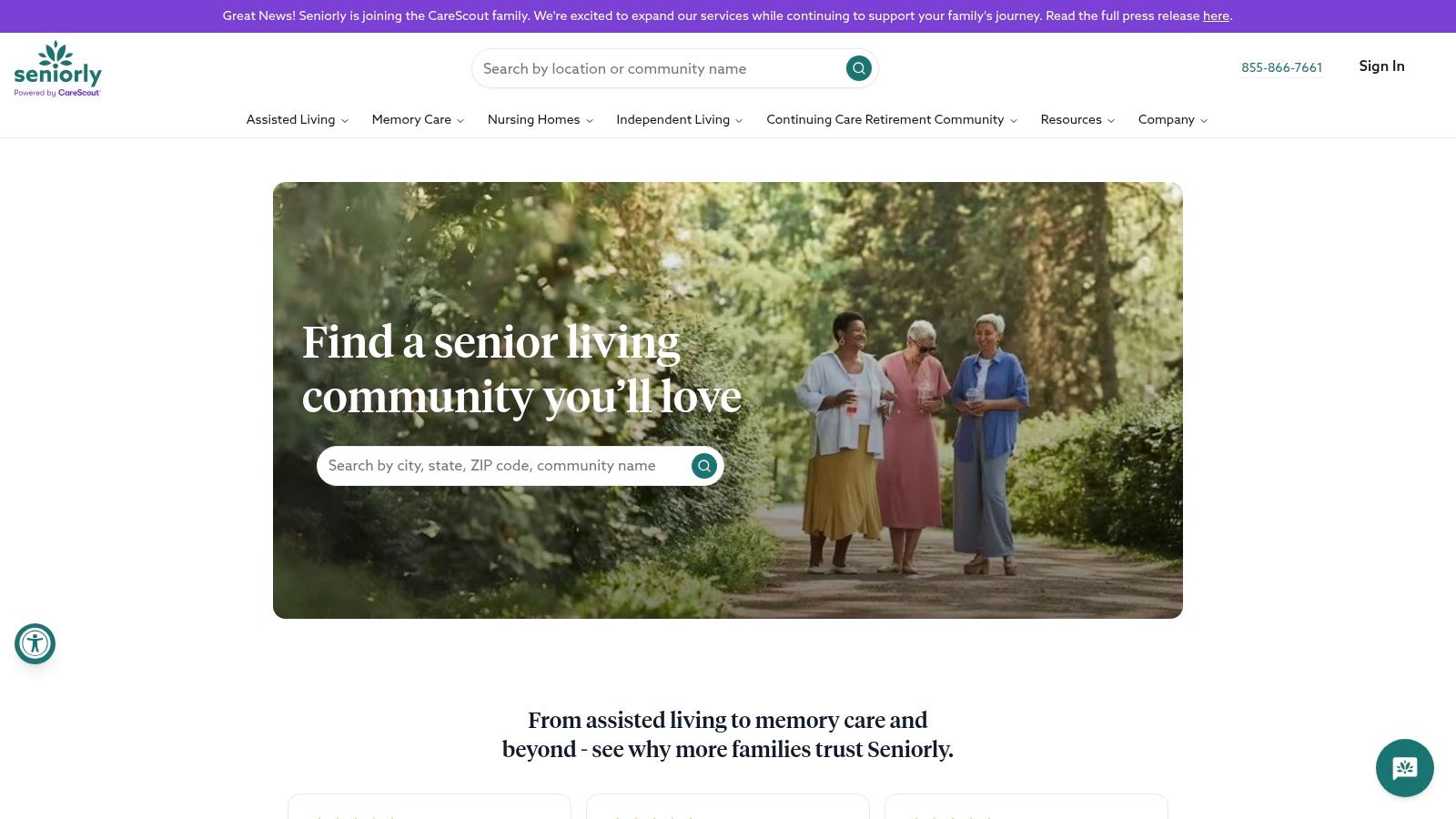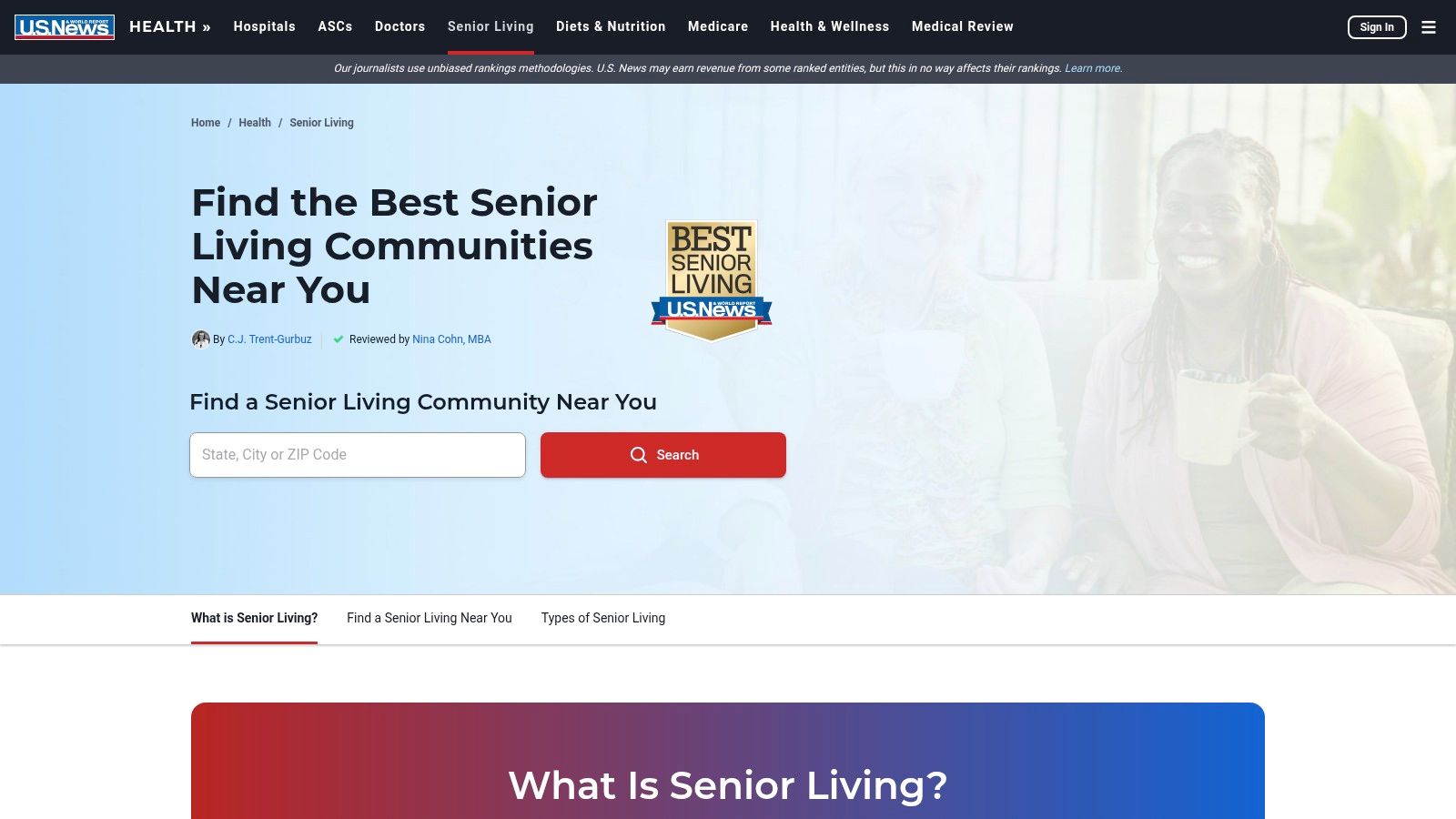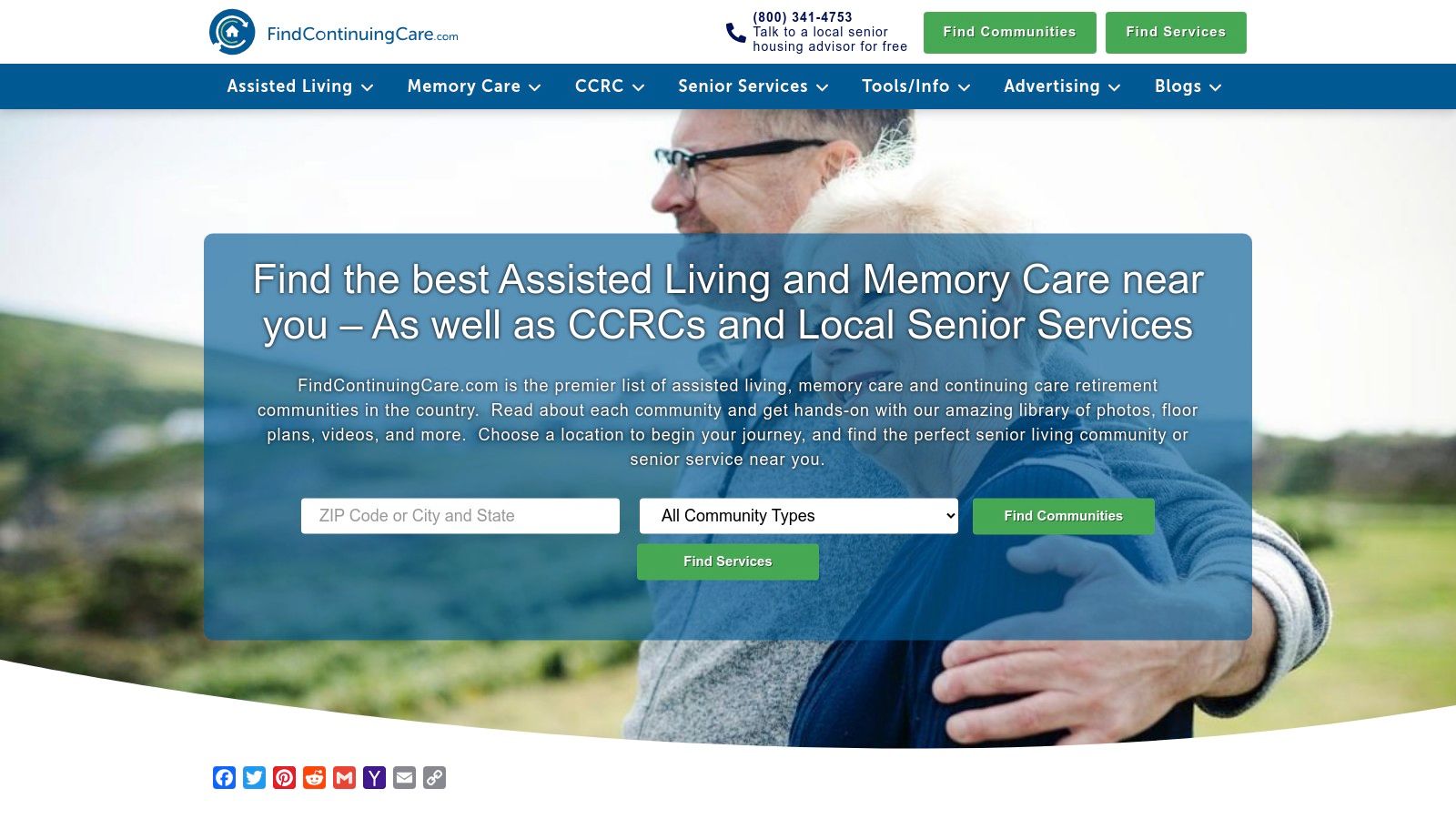Finding Memory Care Communities Near Me: 7 Cleveland Resources
-
Who this helps: Families in Greater Cleveland (Cuyahoga, Lake, Lorain, Geauga, Medina, Summit counties) who are stressed and time-constrained while comparing senior living options like memory care, assisted living, and nursing homes.
-
What this guide does: It provides a calm, clear, and solution-oriented list of the best online resources to find, compare, and understand memory care in Northeast Ohio.
-
Key takeaway: Instead of searching dozens of websites, use a few trusted, localized tools to check costs, read reviews, and get expert help to find a safe and appropriate community for your loved one.
-
Next step: Start by using a free, local advisory service like Guide for Seniors to get a personalized list of vetted options, or use the U.S. News ratings to identify top-performing communities in your area.
Finding the right specialized care for a loved one with Alzheimer's or another form of dementia can feel uncertain and overwhelming. For families in Greater Cleveland, the search for "memory care communities near me" adds another layer of complexity, often involving confusing terminology and financial stress.
This guide simplifies your search by bringing together the most effective online resources for finding and evaluating memory care in Northeast Ohio. We will walk you through each resource, explaining its unique strengths and how it can help you compare communities based on specific needs, from specialized dementia programming to understanding costs and payment options like Ohio's Medicaid Assisted Living Waiver (AL Waiver). Our goal is to equip you with a clear, step-by-step plan to identify the best possible environment for your family member, giving you the confidence to move forward.
Disclaimer: This article is for informational purposes and does not constitute legal, financial, or medical advice. Please consult with licensed professionals for guidance specific to your situation.
Key Takeaways for Your Search
-
Local Expertise Matters: A local advisor who has personally visited Cleveland-area communities can provide insights that a national directory cannot.
-
Define Your Budget First: Memory care costs in Northeast Ohio typically range from $4,000 to $8,000 per month. Costs include a base rate for room and board, plus level-of-care fees (additional charges based on the amount of hands-on care needed).
-
Verify Everything in Person: Use online tools to create a shortlist, but always schedule an in-person tour. Observe staff-resident interactions and use a checklist to compare communities objectively.
-
Understand Ohio's Rules: When comparing options, know the difference between an Assisted Living (in Ohio, a state-licensed Residential Care Facility) and a Skilled Nursing Facility (regulated by the federal Centers for Medicare & Medicaid Services, or CMS). Memory care can be offered in either setting.
-
Check Inspection Reports: You can review the latest health and safety inspection reports for any licensed community through the Ohio Department of Health website.
1. Guide for Seniors
For families in Northeast Ohio, Guide for Seniors offers a powerful and localized starting point when searching for memory care communities near me. Instead of a generic national database, this platform provides a free, hands-on advisory service specifically for Greater Cleveland. Its core strength lies in combining an online directory with personalized, local expertise. Families share their needs, receive a curated list of vetted communities, and often find the right fit within a week of touring.
The service's advisors personally visit and assess each partner community, enabling them to provide nuanced recommendations based on first-hand knowledge of a facility's environment, staff engagement, and specific memory care programs. This on-the-ground insight is invaluable for families who lack the time to research dozens of options from scratch.
Key Features and Practical Benefits
-
No-Cost, Personalized Matching: The service is entirely free for families. After a quick assessment of your loved one's care requirements, budget, and location preferences, a local advisor compiles a shortlist of suitable memory care communities.
-
Transparent Cost Guidance: The website provides realistic monthly cost ranges for memory care ($4,000–$8,000 per month) to help families set budget expectations. Advisors can explain the breakdown of base rates versus level-of-care fees.
-
Ohio Medicaid and VA Support: Advisors offer practical guidance on payment options, including long-term care insurance, VA benefits, and Ohio's Medicaid programs. They can explain the eligibility for the Medicaid Assisted Living Waiver (AL Waiver), which helps cover care costs in an assisted living setting for qualified individuals.
-
Tour Coordination and Comparison: The service helps schedule tours and provides tools to compare communities objectively, simplifying a stressful part of the process.
Example: A family in Cuyahoga County is caring for their mother, who has moderate dementia and a monthly income of $2,300. They are worried about the high cost of memory care. A Guide for Seniors advisor explains how the AL Waiver works in Ohio. They connect the family with communities that accept the waiver and guide them to the local Area Agency on Aging (AAA) to start the eligibility process. This turns an unaffordable option into a viable one.
Pros and Cons
| Strengths | Limitations |
| :--- | :--- |
| Hyper-Local Expertise: Advisors have personally vetted communities in Cuyahoga, Lake, Lorain, and nearby counties. | Geographically Limited: Service is only available for Northeast Ohio. |
| Completely Free for Families: The advisory service comes at no cost to you. | Potential for Bias: The service is paid by partner communities, which could influence recommendations. Always verify information during your tour. |
| Fast and Efficient: Most families find a suitable community within a week of starting the process. | Verification Needed: All pricing and availability details must be confirmed directly with the communities. |
Website: https://www.guideforseniors.com
2. A Place for Mom
As one of the largest senior living referral services, A Place for Mom (APFM) is a powerful starting point for families exploring memory care communities near me. Its extensive network allows caregivers to quickly generate a personalized list of options based on needs, location, and budget. The service is free for families, as APFM is compensated by the communities a senior moves into.

The core of the APFM experience is its team of local Senior Living Advisors. After a brief call to understand your loved one's care requirements and financial situation, they provide a curated shortlist of memory care facilities in areas like Cuyahoga, Lake, or Summit counties and can schedule tours on your behalf.
Key Features and How to Use Them
-
Personalized Guidance: The one-on-one support from a local advisor is the most valuable feature. Be prepared with specifics: diagnosis, key behaviors (like wandering), monthly budget, and desired location.
-
Verified Reviews: With over 400,000 reviews, the platform offers insights from other families. Look for reviews that specifically mention memory care staff and programming.
-
"Best of Senior Living" Awards: Each year, APFM recognizes top-rated communities based on review scores. You can filter your search to see which local memory care providers have earned this distinction.
Pros and Cons for Your Search
| Pros | Cons |
| :--- | :--- |
| Fast Shortlisting: Quickly get a tailored list of communities and book tours. | Lead-Generation Model: Your contact info is shared with advisors and matched communities. |
| Broad Coverage: Useful for comparing options across Greater Cleveland or even other states. | Incomplete Network: Not every memory care community participates, so cross-reference is needed. |
| Free for Families: The advisory service comes at no cost to you. | Advisor-Driven: The experience is heavily reliant on the advisor assigned to your case. |
For an effective search, use APFM to build your initial list. When your advisor schedules tours, go prepared with a detailed set of questions. Using a comprehensive checklist can help you compare communities objectively. For a structured approach, you can find a helpful senior living tour checklist here.
Website: https://www.aplaceformom.com
3. Caring.com
Caring.com is a robust nationwide directory that provides families with data to search for memory care communities near me. Its strength lies in its extensive collection of consumer reviews and detailed local cost guides, allowing for a more informed, budget-conscious search. The platform provides a centralized hub to compare listings, read firsthand experiences, and connect with advisors.
Similar to other referral services, Caring.com offers a free Family Advisor service. However, its on-site tools allow families to conduct significant independent research first. You can filter by location, view photos, and read unfiltered reviews from people with direct experience in memory care units in Cleveland, Akron, or surrounding suburbs.
Key Features and How to Use Them
-
Localized Cost Guides: Before you start, use the platform’s cost guides. These break down average monthly prices for memory care in Ohio and metro areas like Cleveland-Elyria, helping you set a realistic budget.
-
Deep Consumer Reviews: The platform hosts a vast library of reviews. When evaluating a community, sort reviews to find those specifically mentioning "memory care" or "dementia."
-
"Caring Stars" Awards: Each year, Caring.com awards this distinction to communities with a high volume of positive reviews. Filter your search results to see which local providers have earned this honor.
Pros and Cons for Your Search
| Pros | Cons |
| :--- | :--- |
| Deep library of consumer reviews: Provides valuable, real-world insights. | Gated Information: Detailed pricing often requires submitting contact info. |
| Excellent local cost data: Helps set realistic budget expectations. | Incomplete Directory: Not all memory care communities are listed. |
| Convenient advisor access: Easily connect with a Family Advisor. | Lead-Generation Model: Your information is shared with advisors and communities. |
To get the most out of Caring.com, use its cost guides to anchor your budget, then dive into reviews. Create a shortlist based on consistent positive feedback. While it's a powerful tool for initial research, always plan to visit your top choices in person to experience the environment firsthand.
Website: https://www.caring.com
4. Seniorly
Seniorly offers a modern approach to finding memory care communities near me, emphasizing pricing transparency to help families compare options upfront. The platform's clean interface, complete with maps and filters, allows users in Northeast Ohio to quickly assess local memory care providers. Its standout feature is an estimated pricing engine that provides starting rates for different care and room types.

Unlike services that rely heavily on phone-based advisors, Seniorly puts powerful search tools directly in the hands of the user. For families in Cuyahoga, Geauga, or Medina counties, this means you can browse detailed community profiles, view estimated monthly costs, and check availability before making a call.
Key Features and How to Use Them
-
Estimated Pricing Engine: This tool provides "starting from" price estimates for memory care, often broken down by room type. Use this to quickly filter out communities outside your budget.
-
Maps and Verified Listings: The interactive map view is perfect for visualizing community locations. Look for "verified" listings, as these profiles typically have more detailed information.
-
Community Scores and Filters: Each listing includes a "community score." You can filter your search by this score, price, and specific amenities relevant to dementia care, such as enclosed courtyards.
Pros and Cons for Your Search
| Pros | Cons |
| :--- | :--- |
| Transparent Pricing Signals: Helps compare estimated costs before contacting communities. | Estimates Not Quotes: Figures are estimates, not formal quotes. Always confirm with the community. |
| Good User Experience: The interface with maps and filters is intuitive. | Coverage Gaps: The platform may have fewer listings in more rural parts of Northeast Ohio. |
| Monthly Data Refreshes: Pricing information is kept relatively current. | Limited Human Guidance: Less hands-on advisory support compared to other service models. |
Seniorly is an excellent tool for budget-conscious families who prefer to do their own initial research. Use it to create a preliminary list, but remember to contact communities directly to confirm base rates, level-of-care fees, and any one-time fees before scheduling a tour.
Website: https://www.seniorly.com
5. U.S. News Best Senior Living (Memory Care)
U.S. News & World Report brings a data-driven, journalistic approach to identifying top-tier memory care communities near me. Its "Best Senior Living" ratings are based on one of the largest consumer satisfaction surveys of residents and their families, providing an independent quality signal.

The platform empowers families with objective data. By filtering for Memory Care in cities like Cleveland or Akron, you can instantly see which providers earned a "Best Senior Living" badge. This distinction is based on survey responses evaluating the skill of caregiving staff, quality of activities, and overall value.
Key Features and How to Use Them
-
Data-Driven Ratings: The core feature is the annual ratings. When searching, filter by "Memory Care" and your desired location. Pay close attention to communities with the "Best" designation.
-
Detailed Community Profiles: Each rated community has a profile with photos, amenities, and contact information. The methodology is transparent, focusing on metrics like care, safety, and activities.
-
National Scope for Comparison: If you are exploring options in multiple locations, the national scope of U.S. News makes it an invaluable comparison tool.
Pros and Cons for Your Search
| Pros | Cons |
| :--- | :--- |
| Independent, Data-Driven: Ratings are based on actual resident and family feedback. | Not a Full Marketplace: The platform is for research; you contact communities directly. |
| Clear Quality Signals: The "Best" badge helps you quickly identify top performers. | Incomplete Data: A community without a badge may be excellent but lack sufficient recent survey data. |
| National Coverage: Useful for comparing communities across different metro areas. | No Personal Advisor: Lacks the hands-on guidance of a dedicated placement service. |
Use the U.S. News ratings to create an initial list of recognized communities. The ratings provide a strong signal of quality, but a personal tour is essential. For a detailed breakdown of local options, you can see our comprehensive guide to memory care in Cleveland to supplement your findings.
Website: https://health.usnews.com/best-senior-living
6. Alzheimer’s Association & AARP Community Resource Finder
Developed by two leading senior advocacy organizations, the Community Resource Finder is a noncommercial, information-first database. It offers a directory for families searching for memory care communities near me and a wide array of other aging-related services. This free tool allows you to search by zip code to locate housing and crucial support systems, from caregiver support groups to local transportation services.
The platform’s strength lies in its holistic approach. It empowers families with information about the entire ecosystem of dementia care. Listings often include details about accepted payment types and languages spoken. You can also filter for communities that have earned Joint Commission Memory Care Certification, an important quality indicator. While exploring these resources, it's also helpful to understand legal frameworks that might become necessary, such as legal guardianship for persons with Alzheimer’s and dementia.
Key Features and How to Use Them
-
Advanced Filtering: Use filters to narrow results by "Memory care provided," accepted payment types (like Medicaid), and "Joint Commission Memory Care Certification" to prioritize communities recognized for high standards.
-
Integrated Local Resources: Beyond housing, the tool lists support groups, home care agencies, and adult day centers to help you build a complete care plan.
-
Direct Provider Contact: Listings typically include a phone number and a "Contact Provider" button, allowing you to reach out directly.
Pros and Cons for Your Search
| Pros | Cons |
| :--- | :--- |
| Noncommercial Focus: An information-forward tool without sales pressure. | Informational Directory: Listings are not endorsements; quality must be verified by you. |
| Holistic Approach: Pairs housing with essential local caregiver resources. | Limited Pricing Data: You almost always need to contact communities directly for cost details. |
| Certification Filter: Helps identify communities adhering to dementia-care best practices. | User Experience: The interface is functional but less modern than some commercial sites. |
Treat this resource as a starting point for creating a broad list. Recognizing the early indicators of cognitive decline is crucial, and you can learn more about the five key signs that memory care is needed to better inform your search.
Website: https://www.communityresourcefinder.org
7. FindContinuingCare
FindContinuingCare is a nationwide directory that excels at giving families a strong visual first impression when searching for memory care communities near me. It prioritizes high-quality photos, detailed floor plans, and video tours to help caregivers in Northeast Ohio assess if a facility's atmosphere aligns with their loved one's needs.

The website functions as a visually rich catalog of senior living options. For families concerned about the transition to a new living space, being able to view specific apartment layouts or see the design of a secure memory care garden can be incredibly reassuring.
Key Features and How to Use Them
-
Visual-Rich Listings: Prioritize listings with comprehensive photo galleries, floor plans, and video tours to evaluate room sizes, natural lighting, and common areas.
-
Simple Contact Forms: Each profile features clear buttons to "Get Prices & Availability" or "Request a Tour," connecting you directly to the community's admissions team.
-
Local Senior Services: The directory includes related services, such as senior real estate agents or moving companies, which can be a convenient resource if the move involves selling a home.
Pros and Cons for Your Search
| Pros | Cons |
| :--- | :--- |
| Excellent for Visual Evaluation: Easy to assess a community's physical space. | Fewer Reviews: Less user-generated content than larger platforms. |
| Streamlined Contact Process: Simple forms make it easy to request pricing and tours. | Inconsistent Media: Quality of photos and floor plans varies by listing. |
| Focus on Continuing Care: Helpful for long-term planning if a CCRC is a consideration. | Lacks Deep Advisory Content: More of a directory than a guidance service. |
FindContinuingCare is ideal for the visual-gathering stage of your search. Use it to create a shortlist of communities that look and feel right, then schedule tours to verify that the staff and care programs match the promising impression you got online.
Website: https://findcontinuingcare.com
What to Do Next: A 4-Step Action Plan
Feeling overwhelmed is normal, but a clear plan can restore your sense of control. Here is a checklist to guide your next steps.
Your Cleveland Memory Care Search Checklist
-
Step 1: Define Your Needs & Budget.
-
What is the monthly budget (including income, savings, and potential benefits)?
-
What level of care is needed now (e.g., help with dressing, medication management)?
-
What are the key behaviors that require specialized care (e.g., wandering, anxiety)?
-
Which location is most convenient for family visits (e.g., near Westlake, Mentor, or Medina)?
-
Step 2: Create a Shortlist (3-5 Communities).
-
Use a local service like Guide for Seniors for a curated list based on your needs.
-
Cross-reference potential communities on U.S. News or Caring.com to check reviews.
-
Check the latest state inspection report for your top choices on the Ohio Department of Health website.
-
Step 3: Tour & Compare.
-
Schedule in-person tours for your top 3 communities.
-
Use a tour checklist to ask consistent questions at each location.
-
Observe staff interacting with residents—do they seem patient and engaged?
-
Ask to see the memory care unit, including resident rooms, common areas, and any outdoor spaces.
-
Step 4: Review Finances & Make a Decision.
-
Get a written quote from your final choices detailing the base rate and all potential level-of-care fees.
-
If applicable, contact the local Area Agency on Aging to begin the application for Ohio's AL Waiver.
-
Discuss the final decision with your family and trust your gut instinct about which community felt the most welcoming and safe.
Frequently Asked Questions (FAQ)
1. What is the average cost of memory care in the Cleveland area?
In Northeast Ohio, memory care typically costs between $4,000 and $8,000 per month as of early 2024. This cost usually includes a base rate for room, board, and basic services, plus additional "level-of-care" fees based on the resident's specific needs.
2. Does Medicare cover memory care in Ohio?
No, Medicare does not cover the long-term room and board costs of memory care or assisted living. It may cover short-term skilled nursing care after a qualifying hospital stay or specific medical services within the community, but not the daily cost of living and personal care.
3. How can I get help paying for memory care in Ohio?
Some options include Long-Term Care Insurance, VA Aid & Attendance benefits for veterans and surviving spouses, and Ohio's Medicaid Assisted Living Waiver (AL Waiver). The AL Waiver can help pay for care services for financially and medically eligible seniors. To apply, contact your local Area Agency on Aging (AAA).
4. What should I look for during a memory care tour?
Focus on three things: Staff, Safety, and Stimulation.
-
Staff: Are they specifically trained in dementia care? What is the staff-to-resident ratio?
-
Safety: Is the unit secure to prevent wandering? Are there grab bars and emergency call systems?
-
Stimulation: What does the daily activity schedule look like? Are activities adapted for cognitive decline?
5. Where can I report a concern about a memory care community in Ohio?
You can file a complaint with the Ohio Department of Health. You can also contact the local Long-Term Care Ombudsman, who acts as an advocate for residents' rights.
Ready to get personalized, no-cost guidance from a local expert who understands the Cleveland-area memory care landscape? The advisors at Guide for Seniors can help you navigate your options, schedule tours, and connect you with communities that match your specific care needs and budget. Visit Guide for Seniors to get started with a free, confidential assessment today.
Need Help Finding Senior Living in Greater Cleveland?
Our Greater Cleveland local advisors can provide personalized recommendations, schedule tours, and answer all your questions—completely free.